The Highly Versatile Em Dash Posted by Gary Locke on Oct 7, 2021 in English Language

I’ve often remarked on this page that punctuation is a very important and often neglected part of learning English. Of all the little squiggles and lines that make up the world of punctuation, perhaps the most versatile and popular is what we call the em dash. Let’s take a look at what it is, how it got its name, and when to use it.
That’s an Odd Name
In the world of punctuation, there are two common and widely used dashes. They are the en dash and the em dash. Another way to write them might be N dash and M dash. In other words, the en dash is the size of an N and the em dash is just that much longer, or roughly the size of an M. Of course, the size of your font makes all the difference. But, assuming that you are going to type something in only one size font and not write one sentence in Ariel 11 and the next sentence in Calibri 14, the size rule always applies. Em dashes are longer than en dashes, and en dashes are longer than hyphens. For more on hyphens, please see this blog.
To create an em dash if you are typing on a Mac, hold down the Option and Shift keys and type the hyphen symbol. On a Microsoft keyboard, type Ctrl + Alt + –. In Word, I recommend using Auto Formatting. Then type a word and, without adding a space, type two hyphens together, type another word, then a space. Word will insert an em dash between the two words.
So, What’s an Em Dash?
As I said, the em dash is very popular. One esteemed writer that I know estimated that she uses an em dash as much as four or five times more often than she uses a parenthesis, a colon, or a semi-colon. Yet, em dashes are most commonly used in parenthetical cases or in lists—perfectly normal situations for those other punctuation marks.
The Parenthetical Aside
Em dashes serve to expand upon supplemental information. It’s as if someone just told you a fact and then someone else took you aside and told you just a little bit more. They also indicate a brief change in thought before returning to the subject. We tend to think of the use of an em dash as being informal, but they really are more stylistic in nature. They add to the sense of the writer’s voice.
“Many best-selling authors—Ta Nahesi Coates comes to mind— are now also writing comic books.”
Abruptly Ending Sentences
The em dash is also used in fiction to write dialogue that’s been cut off. Think of a horror movie in which two people are walking through a dark basement.
“Did you just hear something?’
“Yes. It sounded like it was coming from just behind— “
“Lisa? Lisa? What happened? Where are you? Lisa?”
Appositives with Commas
Like a parenthetical, appositives are little extra pieces of information. You could use a comma to set the appositive off from the rest of the sentence, but what if there’s more than one piece of information and you need more than one comma? Use the em dash, of course.
“My brother—George, not Kevin—has been using that dentist for nearly twenty years.”
When a List is Followed by an Independent Clause
Here’s an example of an em dash in a recipe that I saw this morning. Notice that the em dash sets the list apart from the purpose of writing the list. It makes the point much more clearly.
“Flour, cold butter, salt, cold water—That’s all you need to make great pastry dough.”
The Difference Between the En and Em Dashes
So, you’re probably wondering what the difference is between an em dash and an en dash—besides the obvious length. You generally just use the en dash to indicate a span of time.
“The band is performing Friday and Saturday nights and Sunday afternoons – October 29th-November 7th.”
Above all, any use of punctuation should be consistent. If you incorporate the use of an em dash in your writing, then use it regularly. If this is the style you like and prefer to use, then keep using it.

Build vocabulary, practice pronunciation, and more with Transparent Language Online. Available anytime, anywhere, on any device.



